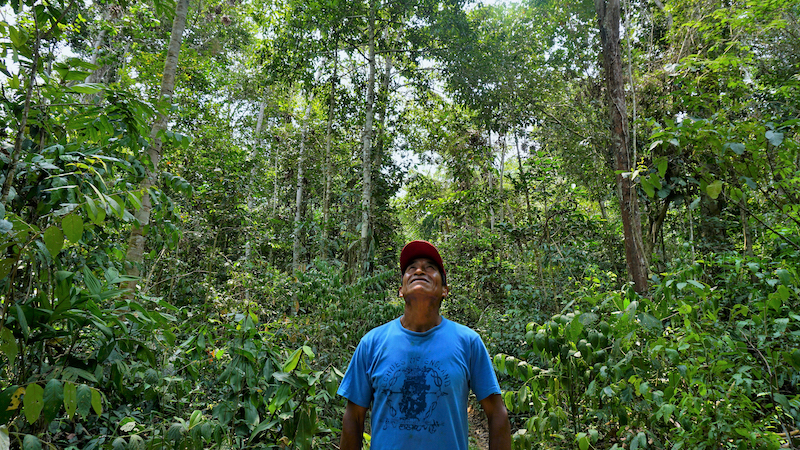The World Bank’s insurance arm is working on plans to protect carbon offsetting projects against political risks in developing countries as a growing number of governments seek to impose new rules onto the market.
The Multilateral Investment Guarantee Agency (Miga) expects to gain an expanding role in providing insurance cover to carbon credits projects in a bid to facilitate large-scale investment in countries considered as high-risk.
The agency’s foray into the carbon market comes as several developing nations are moving to regulate or restrict the trade of credits generated within their borders.
Bitter conflicts stop Eastern Europe from choosing next year’s Cop host
The upheaval has spooked project developers and investors in the $2 billion voluntary market. Hailing predominantly from rich nations, they have been profiting from activities like planting or protecting trees in developing nations and selling on the resulting credits.
Carbon credits – or offsets – are used by companies, governments or people to compensate for the greenhouse gas emissions they generate themselves.
A Miga spokesperson told Climate Home News, as governments around the world are starting to regulate carbon markets, the agency will be able to protect investors against risks of governments breaching agreements.
Fake social media profiles wage “organised” propaganda campaign on Cop28
But some campaigners have expressed concern over Miga’s plans. Teresa Anderson from ActionAid told Climate Home News that offsetting projects “have a long track record of displacing communities while worsening the climate crisis by giving polluters an excuse to avoid real emissions cuts”.
“Miga might claim to be insuring green projects, but in reality, this is about ensuring greenwash”, she added.
Greening Miga
Founded in 1988, Miga’s mission is to help foreign investment into developing countries by issuing guarantees. Its backing allows investors to obtain better financing terms, like cheaper loans, from banks.
Over the years, the agency has come under fire for heavily subsidising fossil fuel energy projects.
But, as part of its updated strategy, it has pledged to increase its support for projects that address climate change.
Comment: Bonn talks offer opportunity to bridge the adaptation gap
The ‘greening’ of Miga’s portfolio is part of a sweeping set of reforms which could give the World Bank a much bigger role in enabling climate finance.
Among a long list of measures, a plan drafted by the bank’s steering committee and currently under discussion sees an expansion of Miga’s guarantees “to cover risks related to carbon rights”.
Pioneering carbon insurance
Miga plans to equip offsets developers with its political risk insurance and to develop new types of covers specifically for carbon investors.
Offset projects have often been contentious. If a dispute between developers and the host country cannot be resolved, Miga may be liable to pay compensation.
The agency funds itself through the financial contributions given by member countries. Its biggest shareholder is the United States (with 18% of capital), followed by Japan, Germany, the UK and France.
The agency will plug a gap in a market for which private insurers have so far shown a lack of appetite. Insurance policies for carbon projects are currently very limited.
Peter Zaman, a carbon markets lawyer at HFW, says project developers don’t have any specific insurance cover normally.
“They have been in denial about the risks and so the products that would protect them have not even been produced,” he said.
Carbon markets upheaval
The risks that Zaman refers to revolve around countries’ ongoing efforts to assert tighter control over carbon rights.
Similar to intellectual property, carbon rights refer to the ability to lay claim to an amount of carbon dioxide trapped or avoided through activities like tree planting and sell it under the guise of credits.
For more than a decade private developers and investors have been setting up projects across the world operating in the loosely regulated voluntary market.
Many of these initiatives have been sharply criticised not only for exaggerating their climate benefits. But also for giving local governments and indigenous populations a small fraction of the profits.

An Indonesian ranger patrols a forest protected through a carbon credit project. Photo: Dita Alangkara/CIFOR
After years-long inaction, now a growing number of governments, especially in developing countries, are waking up to the value of these projects and stepping in to regulate them.
Zimbabwe announced last month it would retain half of all revenue from carbon projects and consider voiding all existing programs in the country.
Zimbabwe hosts Kariba, one of the world’s largest – and most controversial – forest conversation project, which is controlled by Swiss company South Pole.
Elsewhere, Papua New Guinea has suspended new projects while the government decides on new rules for future and existing projects.
Indonesia has restricted exports of carbon credits generated within the country with a view to centrally control sales in the future.
‘Low-hanging fruits’
In regulating offsetting projects, experts say governments are not only motivated by their revenue-raising potential.
Countries are also eyeing the possibility to count the greenhouse gases avoided or trapped through these programs towards their national climate goals under the Paris Agreement.
This calculation will become ever more important when the United Nations set up a new global carbon trading mechanism. The rules will prevent the same credit from being used more than once.
Confusion surrounds China’s pledged climate finance towards the Global South
Peter Zaman says carbon credits are “low-hanging fruits” to achieve climate commitments. “It is entirely logical for countries to establish control over these cheap sources of emission reductions and decide how to best use them”, he added.
Miga believes its involvement in the carbon market will spur foreign investment in riskier countries as new regulations come into place.
The agency says it will protect investors against risks of governments breaching agreements that allow investors to export credits at pre-agreed terms, or risks of governments not respecting double-counting rules.
